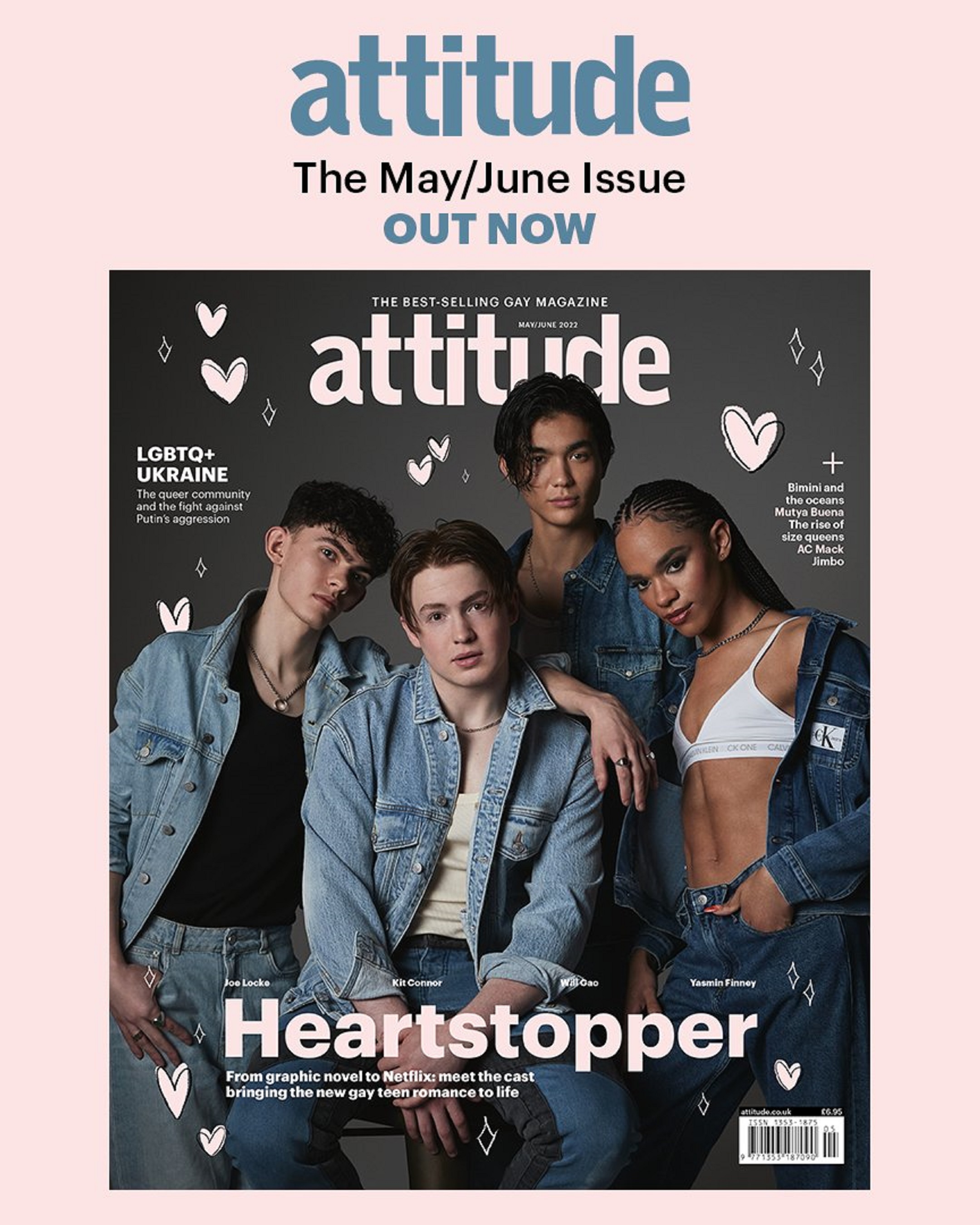‘Don’t Say Gay, Don’t Say Trans’: Democrats are ‘absolutely failing’ the LGBTQ community
Exclusive: Attitude speaks to three people in the United States about Florida's homophobic legislation and what happens next.
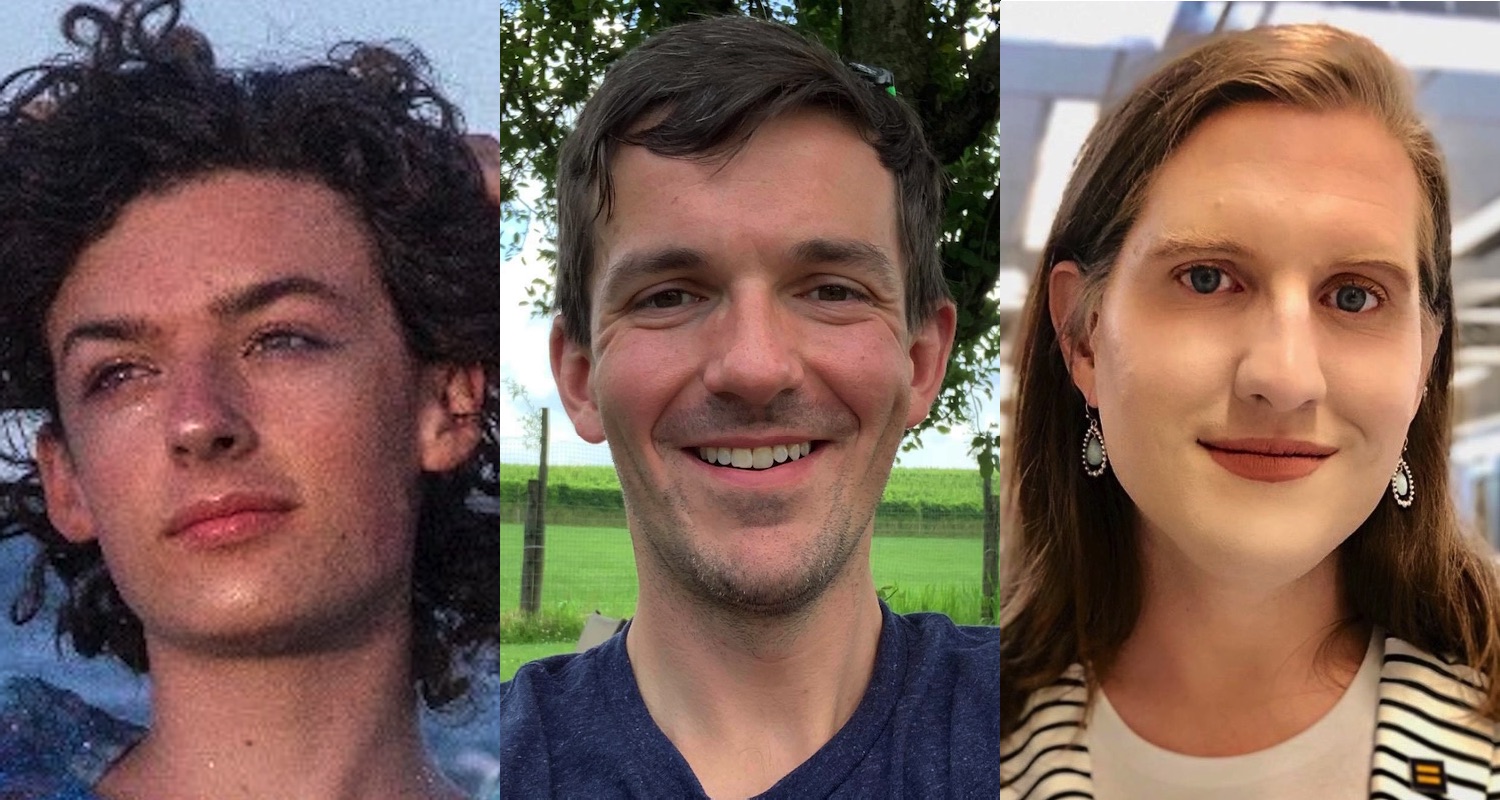
Words: Alastair James; pictures: Provided
There’s a sense of irony to Florida’s nickname of ‘The Sunshine State’ these days.
With the passing and now signing of the ‘Don’t Say Gay, Don’t Say Trans’ bill (we all need to use this name from now on, we’ll get into it later) the sense of optimism and joy that the moniker suggests seems to have dimmed somewhat.
There is a great sense of pessimism about what happens next; that much is clear from my conversations with LGBTQ students, parents, and activists in the wake of the horrendous bill becoming law (due to take effect from 1 July)
“A lot of my close friends are living houseless right now”
Despite knowing the bill would almost inevitably be signed into law, “it is nonetheless hard to see it become a reality,” says Will Larkins, 17, from Winter Park High School, near Orlando.
“The Republicans, the Florida legislature, and Ron DeSantis are writing into law an outdated and dangerous stereotype that is going to endanger my community. They are equating being queer to being predatory while banning education on a vital topic in the years that it is most important to learn about. After fighting relentlessly for months, I am exhausted, but this is not the end,” they continue.
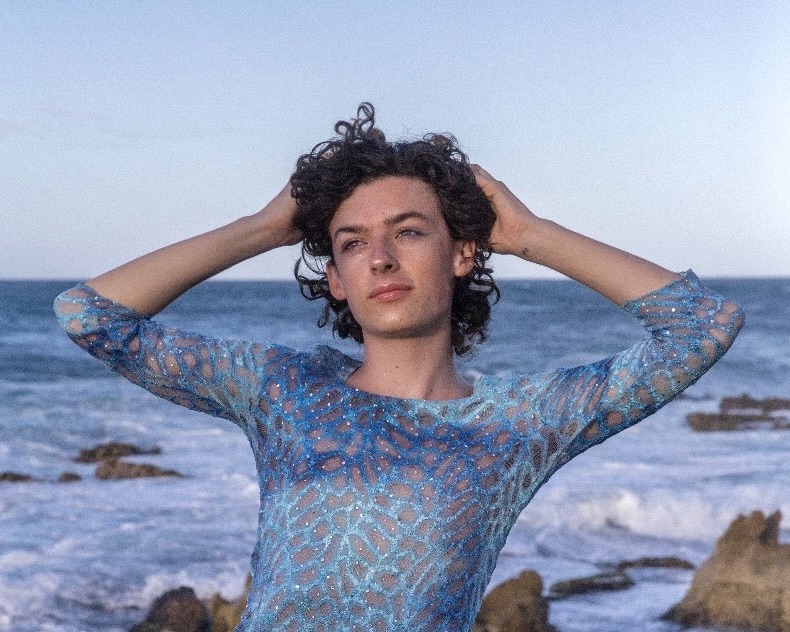
Will Larkins (Photo: Will Larkins)
A queer non-binary student campaigner, Will gained attention after writing an op-ed for The New York Times in which they shared their own experiences growing up LGBTQ in high-school.
“A lot of people said it represented a perspective that hadn’t really been represented before. A lot of people messaged me saying they had similar experiences and related heavily to how I described growing up queer. It made me really happy that I was able to represent those people because I am one of those people.”
Will tells Attitude that they experience homophobic or transphobic bullying pretty much every day. They recognise that they’re privileged to have supportive parents. Sadly, however, some of their friends are not so fortunate.
This, they add, is why the argument from the law’s proponents that it’s about giving the parents a greater say on what their children are taught is ridiculous.
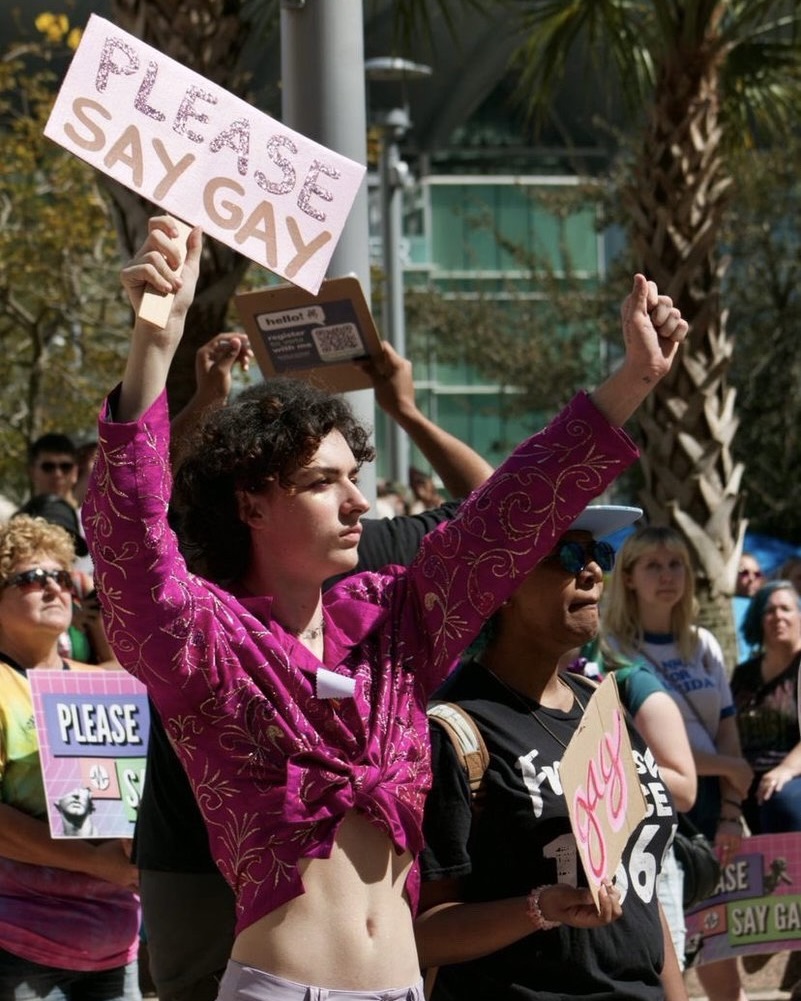
Will Larkins (Photo: Will Larkins)
“Some of my friends have come live with me after being kicked out of their house. A lot of my close friends are living houseless right now because they’ve been kicked out of their house for being queer. Queer people make up 40 percent of the homeless population and only 5 percent of the general population.
“My parents know that this bill is gonna endanger kids and as parents, they’ve told me they’ve been supportive, but they haven’t been necessarily the best advocates. And because of that, they have straight up said, ‘we don’t know what we’re doing. Parents don’t know what they’re doing. They don’t have to follow a set of standards. So we shouldn’t have the right to choose what’s taught and what’s not taught in schools. Because that should be up to the professionals.'”
“Public school should be a place where every student feels accepted”
Adam Podowitz-Thomas, a 36-year-old gay father in Pennsylvania, agrees. He also questions the integrity of the argument that this is ‘for the parents’.
“I think that it’s ignoring the rights of my family to be represented in schools. Why is it that it’s okay for students to read books that have heteronormative couples but not gay couples? I don’t object to my daughter reading books with a mom and a dad. But if I did, what would my recourse be? That’s clearly not what this is about.
“It’s about trying to shove families like mine back in the closet. And that’s really all it is. So, the idea that a parent can’t talk to their kids about their own morality, or their religious views, or whatever it is in the privacy of their own home, like, go ahead. But that doesn’t mean that that’s what should be taught in public schools.
“Public school should be a place where every student feels accepted. And every student feels like they can be part of the community that’s gathered there.”
Adam had an overwhelmingly positive reaction to a Twitter thread of his about introducing his daughter to a children’s book with same-sex couples in and how she saw her family represented for the first time. (It’s a heartwarming thread, I promise!)
Before anyone goes about defending any of the “Don’t Say Gay” laws, let me tell you a quick story about my daughter.
My daughter attended a local, reasonable daycare. Nothing special, nothing wrong, just normal.— Adam Podowitz-Thomas 🇺🇦 (@AdamPodTho) March 15, 2022
Adam says, “What I saw were other queer parents, seeing how much it meant to them to have somebody express that viewpoint. People who wished they had books like this when they were kids. I certainly am in that camp.
“I had librarians reach out and say they were going to make sure that they added the book to their libraries, and teachers saying they are going to keep sticking up for their kids anyway. So the overwhelming reaction was really lovely, and frankly, quite surprising.”
Adam’s story strikes a poignant note as it’s worth considering the mental, emotional, and in some cases, physical damage laws preventing these types of resources and inclusive education, have had on generations of LGBTQ people.
This writer can certainly attest to that as the UK’s Section 28 (which bears a frightening resemblance to the ‘Don’t Say Gay, Don’t Say Trans’ bill) was only appealed in 2003, just as I moved up to high school. Had there been even the slightest mention of gay relationships, I might not have spent so many years in a pit of shame and despair.
As it was, the vagueness of Section 28 (which can also be said for the ‘DSG, DST’ bill) meant teachers couldn’t be sure if anything they said would lead to a prosecution.

Adam Podowitz-Thomas (Photo: Adam Podowtiz-Thomas)
Adam had a rough coming out.
“My parents were not the most accepting,” he says. “And that led me to attempt suicide a couple of times when I was a teenager. It’s not an exaggeration to say that the people that saved my life were my teachers. They saw the angst and the hurt that was in me and reached out and provided me access to resources that saved my life. Quite literally.”
As a result, he worries about teachers’ ability to carry out that role in light of the Florida bill.
“One of the things I didn’t realise until I had kids on my own: kids spend a huge percentage of their day every day in schools. They’re there for eight hours a day. Teachers know the kids really well, they can see when they need things. And I don’t think we should be making it harder for teachers to support their students.”
Adam says his concerns, as a parent, are more about his daughter knowing and being okay with diversity, as well as the basics of reading and writing.
“There are actual existential problems in our world, like climate change, but I would much rather my daughter be a part of her curriculum than them trying to say that she shouldn’t hear about her family in school. There are so many things that are more important than having this fight, that I think the legislature is really falling down on its job by focusing on us.”
“There is a vacuum of information and leadership”
For Charlotte Clymer, 35, a writer and trans-activist in Washington DC, the failure goes beyond Florida’s state legislature and concerns the wider political climate.
“The only reason that DeSantis is pushing this bill, that Greg Abbott is pushing this anti-trans executive order in Texas, and all these pieces of anti-trans and anti-LGBTQ legislation are to rally the Republican Party’s base for the midterm elections. That’s it.”
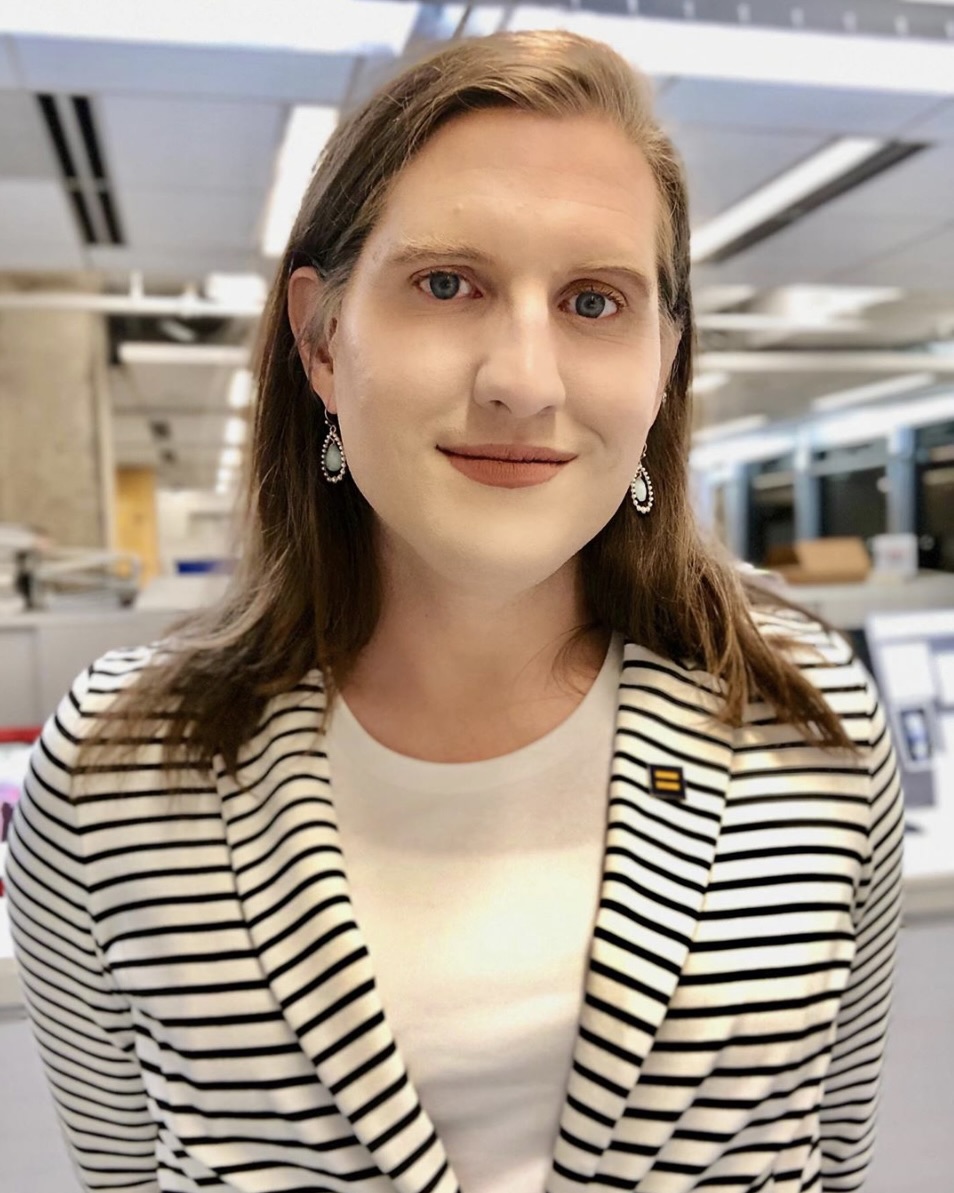
Charlotte Clymer (Photo: Charlotte Clymer)
And while President Biden has spoken inclusively of trans people, the Democrat party as a whole isn’t doing enough, which worries Charlotte.
“The problem is that there is a vacuum of information and leadership in talking about trans equality and these anti-trans actions taken by the Republican Party. They’re the only ones talking about it. So if all you have is Republicans putting out this horrific anti-trans propaganda, and then you have Democratic leadership who are largely silent, the public is only getting one side of the story.”
Charlotte goes on to say that the apparent lack of awareness on trans issues among Democrat candidates is very disturbing.
“We’ve seen an avalanche of anti-trans legislation and an avalanche of anti-trans executive orders across the country. Last year was the deadliest year on record for trans non-binary people in the United States, at least 57 trans people were murdered.
“I didn’t think two months ago that the governor of Texas would issue an executive order that essentially permits a state agency to investigate the parents of trans children for providing them access to gender-affirming care. And yet, here we are, and we’re already seeing states that are trying to emulate what Texas is doing.”
And unless Democrats stand up and fight, more trans lives will be lost Charlotte laments. Are Democrats, then, failing the LGBTQ community?
“Absolutely. President Biden has done an admirable job, but he is one person. But if you don’t have Democratic leadership out front, talking about why this is wrong, pushing back against the propaganda that we see across the board, from the Republican party, it’s only going to get worse for the trans community and especially trans children,” concludes Charlotte.
Another thing bothering Charlotte is the framing of Flordia’s bill as the ‘Don’t Say Gay’ bill when it will affect trans pupils just as much. She gets why that might be the case, pointing out Kate McKinnon’s take on the subject, which she is sure was well-intentioned, on a recent episode of Saturday Night Live.
“It’s the kind of lack of visibility on trans equality that leads to even further marginalisation of trans children, you know, trans families, trans teachers across the board. And it’s something that’s easily fixable. You know, all it takes is a slight reframe.”
Her take: “Maybe say ‘Don’t Say Gay, Don’t Say Trans’? Just make sure that you’re talking about trans equality and all this.”
“People will fight back”
During our conversation, Will voices concern that Florida is regressing. They were initially talking about the arguments being used in an evidence session before the passing of House Bill 1557 (‘DSG, DST’) but I ask if they can elaborate on it.
“This [1557] is the second parental rights and education bill. The last one also attacked the LGBTQ community and had a lot of transphobic messaging. 1557 also isn’t the only anti-diversity bill that just passed. It’s just getting the most press.
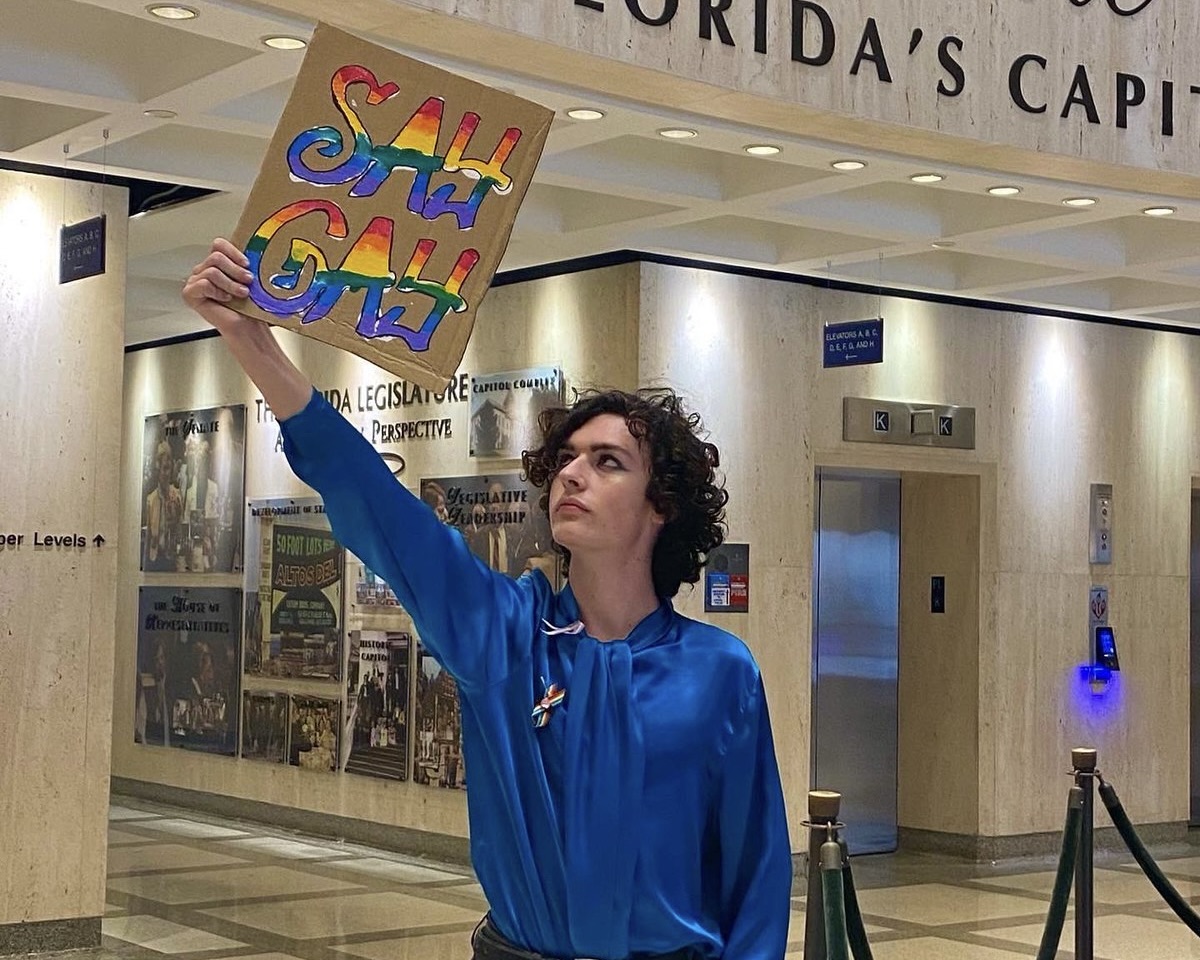
Will Larkins (Photo: Will Larkins)
“House Bill seven, for example, bans discussions of racial history that make kids feel guilty about their race. They’re trying to protect white kids from feeling guilty about race. And it’s an attack on critical race theory. House Bill five also just got passed. That’s a ban on abortion for 15 weeks with no exception for rape and incest.”
Will worries what precedent Florida has set. With good reason too, as Georgia, Alabama, Ohio, and Texas are starting to introduce similar legislation.
“We’re slowly inching backwards, and it is really frightening as someone who is part of a marginalised community who’s living here.”
Elections are just a few months away in November. In the face of such oppression, is there much optimism that things will change?
Charlotte isn’t sure.
“On this current track, I’m not very hopeful at all. The irony of this is the Democrats are afraid that talking about trans issues will hurt them in the midterms. Republicans see this fear and keep ratcheting up the anti-trans rhetoric, which not only dims the prospects for Democratic candidates, but also increases the harm that’s done to trans people. Democrats could knock out two birds with one stone here, if they did the bare minimum and educated themselves on trans issues, and then were forceful about educating the public. It’s a damn shame. This is something that Democrats could easily win.”
Adam strikes a more hopeful note.
“I think that this is part of a pattern of using minority groups to try to shore up votes by mostly white voters. And I hope that there’s some solidarity that comes out of it. You think about things like the critical race theory bills that have been getting passed in other states.
“I just think it’s very easy to create these faux enemies that are allegedly going to ‘hurt’ kids in some way. But ignore the fact that kids themselves have these identities, too. And so, I hope groups come together and fight back and November would be a great time to do that.”
Will is determined: “People will fight back. And then we will vote them out.”
The Attitude May/June issue featuring the cast of Heartstopper is out now.
